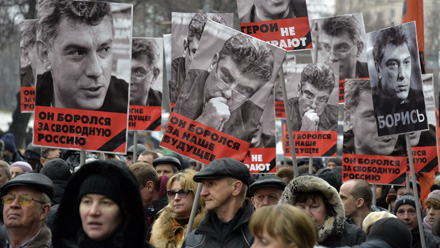Boris Nemtsov: will his killers be brought to justice?
World leaders call for full and transparent investigation into murder of opposition politician Boris Nemtsov

A free daily email with the biggest news stories of the day – and the best features from TheWeek.com
You are now subscribed
Your newsletter sign-up was successful
Vladimir Putin announced that he will take "personal control" of the investigation into the death of prominent opposition politician Boris Nemtsov, raising fears that the crime may never be seriously examined.
World leaders condemned the killing of Nemtsov, who was shot dead in Moscow on Friday evening. The former deputy prime minister and renowned Putin critic was reportedly shot four times in the back, possibly from a passing car.
UK prime minister David Cameron called for the crime to be "fully, rapidly and transparently investigated, and those responsible brought to justice".
The Week
Escape your echo chamber. Get the facts behind the news, plus analysis from multiple perspectives.

Sign up for The Week's Free Newsletters
From our morning news briefing to a weekly Good News Newsletter, get the best of The Week delivered directly to your inbox.
From our morning news briefing to a weekly Good News Newsletter, get the best of The Week delivered directly to your inbox.
"His life was dedicated to speaking up tirelessly for the Russian people, to demanding their right to democracy and liberty under the rule of law, and to an end to corruption," Cameron said. "He did so without fear and never gave in to intimidation."
US president Barack Obama said there must immediately be a "prompt, impartial and transparent" investigation into the killing.
But some analysts believe that Putin's direct involvement means that the crime may never be properly investigated.
"By placing the Russian official investigation into Mr Nemtsov’s death under his direct control, Mr Putin has ensured that nothing unfavourable to him or his regime will ever come out of this inquiry," The Guardian says. "It is an egregious sign of the concentration of powers in Russia that the work of the police and judiciary should be so openly placed under the authority of the presidency".
A free daily email with the biggest news stories of the day – and the best features from TheWeek.com
Nemtsov is not the first Kremlin critic to have been killed since Vladimir Putin first assumed office in 2000. Dozens of journalists have been killed in the past 15 years, and few of those responsible have ever been brought to justice, Quartz notes. Political murders often go unsolved "because of the interwoven nature of criminality and Russian officialdom", the website says.
Still, the assassination of a well-known politician, is relatively unusual, The Atlantic says, but the obfuscation over who was behind the crime has already begun.
The Kremlin committee formed to investigate the murder has already proposed three possible theories including the possibility that Nemtsov's commentary about the attack on the satirical French magazine Charlie Hebdo may have made him a target of Islamists. The committee also suggested that Nemtsov's position on Ukraine could have made him a target and – "most spectacularly" – that he may have been killed by Putin's rivals as a 'sacrificial victim' in order to rally support for opponents of the government.
Whether the murder was ordered by Putin directly or not, it "sheds a harsh light on the nationalist regime fuelled by propaganda that the Russian president has created", The Guardian says. "Putin has made it a staple of his rule to launch nationwide hate campaigns against those deemed 'traitors' in a way reminiscent of the Stalinist era".
Putin's suggestion that Nemtsov's murder may have been a "provocation" aimed at destabilising him is "the insulting reflex of a man who seems incapable of remorse and who has turned Russia into a gangster state", The Times says. "It will not change until he goes".